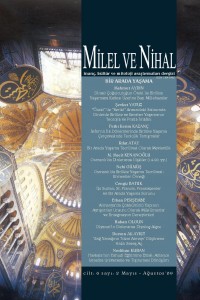Öz
In this article we attempt to clarify the legal status of non muslim communities and their religious leaders in the Ottoman Empire in the lights of the Ottoman legal regulations, imperial firmans issued by Ottoman administration, and archival documents. This article aims to point out to the principle sources and mechanisms of the Ottoman political system which enabled co-existence and a multicultural social life. The legal and mental mechanisms which enabled and provided the minimum conditions of living together, the bases which were the essences of the applications of the Ottoman Empire towards non-muslim religious societies are taken into account from a legal perspective. In the Ottoman Empire basic human rights such as “right to live”, right to own property” “right to security of person” was realized by the Ottoman legal system. As a matter of fact, Islamic law provided a legal protection to non-muslims (ahl-al-kitab) who did not accept or approved the basic principles of Islam. Because of these legal principles and structures non-muslim protected their identities and cultures in Islamic societies. In this paper the applications of Ottomans towards non-muslims, the freedoms of non-muslims and the boundaries imposed on them will be explained. Instead of so-called millet system which is widely used by most of the scholars to explain Ottoman approaches towards non-muslims, a different approach, namely Iltizam system, is being stated.
Anahtar Kelimeler
Ottoman Empire non-muslims (ahl-al-kitab) co-existence multicultural social life.
Öz
Bu makalede Osmanlı İmparatorluğunda gayrimüslim cemaatler ve onların ruhani liderlerinin hukuki statüleri, Osmanlı arşiv belgeleri ve hukuki düzenlemeleri çerçevesinde ele alınmaya çalışılmaktadır. Makalenin amacı çok-kültürlü bir toplumda bir arada yaşamayı mümkün kılan Osmanlı politik sisteminin hangi mekanizmalardan yararlandığını ve hangi temel prensiplere dayandığını açıklamaktır. Özellikle bir arada yaşamayı sağlayan ve mümkün kılan hukuki ve zihni altyapının oluşumundaki Osmanlı uygulamasının temel esasları, hukuki açıdan ele alınmaktadır. Osmanlı hukuk sistemi gayrimüslimlere hayat, hürriyet ve mülkiyet gibi temel hakları tanımaktadır. Esasen bu uygulama bizatihi İslam hukukunun gayrimüslimlere sağladığı garantilerin tabii bir sonucudur. Bu temel prensipler sayesinde gayrimüslimler kültürlerini ve kimliklerini İslami toplumlarda koruyabilmişlerdir. Bu makalede ana hatlarıyla gayrimüslimlerin sahip oldukları haklar ve onlara getirilen yasaklamalar irdelenmektedir. Konuyla ilgilenen çok sayıda ilim adamının meseleyi açıklamada yaygın şekilde kullandığı “millet sistemi” yerine alternatif bir sistem olarak “İltizam sistemi” açıklanmaktadır.
Ayrıntılar
| Birincil Dil | Türkçe |
|---|---|
| Bölüm | Makaleler |
| Yazarlar | |
| Yayımlanma Tarihi | 1 Haziran 2009 |
| Gönderilme Tarihi | 5 Kasım 2014 |
| Yayımlandığı Sayı | Yıl 2009 Cilt: 6 Sayı: 2 |


